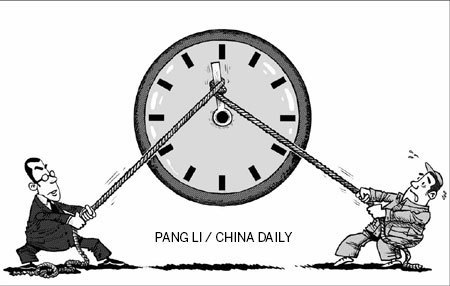End double-track pension system
Updated: 2012-06-28 13:26
By Wang Yiqing (China Daily)
|
||||||||

Facing severe opposition and criticism from the media and the public, the Ministry of Human Resources and Social Security clarified to People's Daily on June 20 that it has no immediate plans to defer the retirement age. But it admitted a study about delaying the retirement age is under way, and also reiterated that delaying the retirement age is inevitable in the long run.
Although statistics from the ministry show China's pension fund accumulative balance exceeded 1.9 trillion yuan ($300 billion) by the end of 2011, it's widely believed there will be a huge gap in future pension payments and China will face tremendous pension financing pressure in the future.
As early as 2005, the World Bank predicted China's pension gap may accumulate to 9.15 trillion yuan in 2075 if the system doesn't change. A recent study by Fudan University's research group, headed by Deutsche Bank's chief economist Ma Jun, says under the current system the accumulative pension gap in 2050 will be more than 20 percent of the government's fiscal expenditure that year. And the present value of accumulative gap in the following 38 years will be equal to 75 percent of the current GDP.
Besides the transformation costs caused by pensions paid to people who retired before the establishment of current pension system, which has resulted in short-term pension payment pressure, experts generally agree that the nation's aging population is the main cause of the huge gap in the long term.
Statistics from the 6th National Population Census in 2011 show that in China people over the age of 60 comprise 13.26 percent of the population. UN statistics show that from 1990 to 2010 Chinese people's average life expectancy has increased by about four years. The trend for longer lives will continue, which means there will be an increasing demand for pensions. Moreover, the family planning policy initiated in the 1980s means China will have fewer people joining the labor force in the future, which means China will age before it gets rich, which is different from the situation in many developed countries.
Deferring the retirement age is not only feasible but also necessary if the country is to solve the pension gap problem. But the unfair institutional design, the so-called double-track pension system, has resulted in public resistance to raising the retirement age. Under the double-track system, civil servants in government organizations and institutions don't have to pay pension premiums during their time in office, while employees in enterprises and their employers have to pay a lot.
A study by Professor Bai Chong'en at Tsinghua University in 2010 showed that the social security insurance premiums that Chinese enterprises and employees pay exceed 40 percent of the average wage, which means it ranks first among 181 countries. If the retirement age is to be deferred, heavy premiums and institutional discrimination may cause further losses to the employees of companies, as well as their employers.
"What people really dislike is the injustice and unfairness that deferment of the retirement age may bring about under the current fragmented pension system, rather than deferment of the retirement age itself," says Zhang Zhanxin, a researcher in social security with the Chinese Academy of Social Sciences to the media.
Even if the authorities finally adopt a flexible retirement policy, who should defer their retirement age and to what age are still questions that need to be answered. It's unrealistic to demand manual workers retire as late as brainworkers do.
People who support delaying the retirement age are generally white-collar workers, many of whom are employees of government organizations and institutions. A policy that defers the retirement of these people, who don't need to pay pension premiums but who receive high pensions after retirement, will do little to solve the pension gap problem.
Before discussing the feasibility of any policy, we should first guarantee it is fair and unbiased. The authorities should reform the current pension system before they consider raising the retirement age.
The author is a writer with China Daily.
wangyiqing@chinadaily.com.cn

 Relief reaches isolated village
Relief reaches isolated village
 Rainfall poses new threats to quake-hit region
Rainfall poses new threats to quake-hit region
 Funerals begin for Boston bombing victims
Funerals begin for Boston bombing victims
 Quake takeaway from China's Air Force
Quake takeaway from China's Air Force
 Obama celebrates young inventors at science fair
Obama celebrates young inventors at science fair
 Earth Day marked around the world
Earth Day marked around the world
 Volunteer team helping students find sense of normalcy
Volunteer team helping students find sense of normalcy
 Ethnic groups quick to join rescue efforts
Ethnic groups quick to join rescue efforts
Most Viewed
Editor's Picks

|

|

|

|

|

|
Today's Top News
Health new priority for quake zone
Xi meets US top military officer
Japan's boats driven out of Diaoyu
China mulls online shopping legislation
Bird flu death toll rises to 22
Putin appoints new ambassador to China
Japanese ships blocked from Diaoyu Islands
Inspired by Guan, more Chinese pick up golf
US Weekly

|

|






